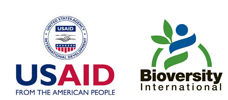Bioversity International has announced the receipt of a US$1 million grant by the Development Innovation Ventures (DIV) program at USAID to crowdsource crop improvement to combat climate change for smallholder farmers in Central America.
 10 December 2014: Bioversity International has announced the receipt of a US$1 million grant by the Development Innovation Ventures (DIV) program at USAID to crowdsource crop improvement to combat climate change for smallholder farmers in Central America.
10 December 2014: Bioversity International has announced the receipt of a US$1 million grant by the Development Innovation Ventures (DIV) program at USAID to crowdsource crop improvement to combat climate change for smallholder farmers in Central America.
Bioversity International and partners, CATIE, Zamorano, and Virginia Polytechnic Institute, are piloting a ‘crowdsourced crop improvement’ (CCI) as an alternative to participatory variety selection (PVS), an expensive approach in which farmers get directly involved in testing varieties and which involves planting on-farm trials that farmers regularly visit. Bioversity International estimates that CCI will be 43-78% more cost-effective than PVS and easier to scale to include thousands, and eventually millions of farmers.
The CCI approach involves more farmers by reducing the scientific supervision needed, travel costs, and the number of varieties that each individual farmer evaluates. Once researchers select a diverse set of varieties, farmers receive a different combination of three varieties for planting. The farmers rank the varieties across their most important characteristics, and report their observations by mobile telephone.
CCI allows farmers to compare the test varieties with their traditional varieties on their own plots throughout the growing season and then report observations and receive information from researchers in real-time. Researchers will set up inexpensive weather sensors in farmers’ fields to record temperature and humidity, which together with farmers’ feedback, will help evaluate crop traits related to climate adaptation.
Over the past two years, CCI pilots have been launched in Ethiopia, Honduras and India, showing that this approach produces solid data without increasing costs, according to Bioversity. In the future, Bioversity International plans to scale this project throughout Central America, with the potential to reach 2 million grain-producing households. Bioversity International is a member of the CGIAR consortium. [Bioversity International News]